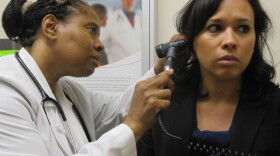Many clinicians at urgent care centers are writing inappropriate prescriptions for patients, according to a new study by Michigan Medicine researchers.
The study analyzed millions of visits to urgent care clinics across the U.S., finding that antibiotics and steroids were frequently prescribed for some conditions for which they are of no use, or for conditions where they're generally not necessary, like steroids for sinus infections.
According to the study,
- Antibiotics were prescribed for 31% of patients diagnosed with middle ear infections, 46% with genitourinary symptoms (like vaginal complaints) and 15% with acute bronchitis, despite being "never appropriate."
- Steroids were prescribed in 24% of sinus infections, and 41% of acute bronchitis for which they are "generally inappropriate."
Researchers say wrong prescriptions are responsible for preventable harms. Overprescribing antibiotics has led to the development of treatment-resistant "super bugs," and steroids have many potential side effects, such as insomnia, mood changes, headaches, and a temporary increase in blood pressure.
The research also found that urgent care centers prescribed opioids in "generally inappropriate cases," although the rate was lower than for steroids and antibiotics. That included opioids for non-back musculoskeletal pain (5% of cases), abdominal pain and digestive symptoms (6%), and sprains and strains (4%).
The overprescribing of opioids can lead to patients becoming dependent on the drugs, as well as side effects including constipation, sleepiness, dry mouth, and upset stomach.
Researchers said urgent care clinicians would benefit from tailored stewardship programs, which could include audits and other forms of feedback, more clinician education about appropriate versus inappropriate drug prescribing, and coaching to learn how to better explain to patients that an antibiotic, for example, won't help in their case.














